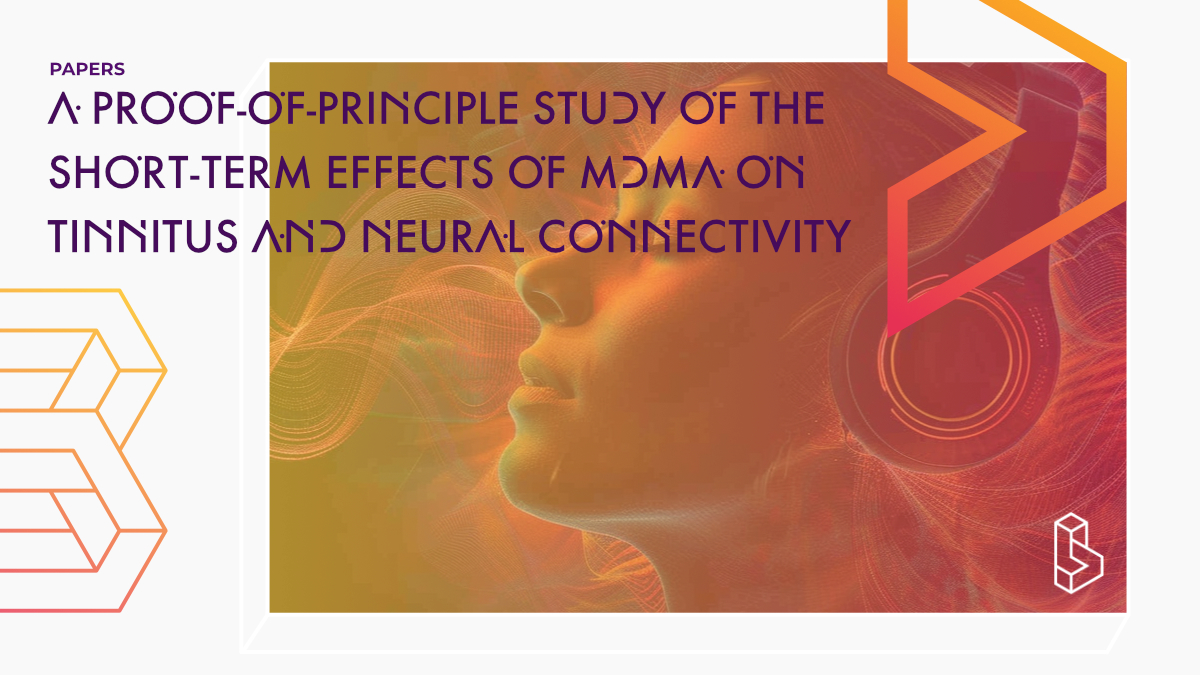This double-blind, randomized, controlled cross-over study (n=13) explores MDMA’s (30-70mg) impact on tinnitus through behavioural and rs-fMRI assessments. No notable effects were observed at the lower dose. However, the 70 mg dose significantly reduced tinnitus annoyance and ignore ratings post-administration. Neurophysiological analysis revealed decreased connectivity in emotion and memory-related brain regions (hippocampal and amygdala) and increased connectivity in sensory processing and attention areas (right post-central gyrus, posterior and superior temporal gyrus, thalamus, and frontoparietal network) with MDMA versus placebo.
Abstract of A proof-of-principle study of the short-term effects of MDMA on tinnitus and neural connectivity
“Background: This study was conducted to investigate the short-term behavioural and neurophysiological effects of 3,4-methylenedioxymethamphetamine (MDMA) on tinnitus perception.
Methods: A double-blind randomized controlled cross-over design. Part 1. Behavioural measures of tinnitus following 30mg MDMA or placebo administration (N=5 participants) and Part 2. Behavioural measures of tinnitus and correlations between pairs of apriori regions of interest (ROI) using resting-state functional magnetic resonance imaging (rs-fMRI) before and after 70mg of MDMA or placebo (N=8 participants).
Results: The results to MDMA were similar to placebo. For the 70mg dose, there was a significant reduction after 4h in annoyance and ignore ratings. RsMRI showed decreased connectivity compared with placebo administration between the left hippocampal, right hippocampal, left amygdala and right amygdala regions, and between the right posterior parahippocampal cortex and the left amygdala after two hours of 70mg MDMA administration. Increased connectivity compared to placebo administration was found post MDMA between the right post-central gyrus and right posterior and superior temporal gyrus, and between the thalamus and frontoparietal network.
Conclusions: Following 70mg of MDMA two tinnitus rating scales significantly improved. There was, however, a placebo effect. Compared with placebo the rsMRI following the MDMA showed reductions in connectivity between the amygdala, hippocampus and parahippocampal gyrus. There is sufficient proof of concept to support future investigation of MDMA as a treatment for tinnitus.”
Authors: G. D. Searchfield, T. N. E. R. Poppe, M. Durai, M. Jensen, M. A. Kennedy, S. Maggo, A. L. Miller, J. Park, B. R. Russell, G. S. Shekhawat, D. Spiegel, F. Sundram & K. Wise
Summary of A proof-of-principle study of the short-term effects of MDMA on tinnitus and neural connectivity
Tinnitus is a condition that arises as a result of neuroplastic changes across several overlapping brain networks in response to changes in auditory sensitivity. MDMA, a psychoactive drug that was initially developed to treat depression and anxiety disorders, may have beneficial effects on tinnitus.
MDMA has a half-life of 9 hours (+/- 2.25 hours) and the effects are felt from 45 minutes. It has been used as a catalyst to improve outcomes of psychotherapy in a number of studies. MDMA reduces the arousal to negative sounds by mediating serotonergic signalling, which has been implicated in tinnitus generation. MDMA inhibits the neurotransmitters serotonin, dopamine and norepinephrine, increases release and slows reuptake of dopamine, and increases activity in the ventromedial frontal and occipital cortices, inferior temporal lobe and cerebellum.
MDMA also promotes neuroplasticity through brain-derived neurotrophic factor. Tinnitus has been shown to affect the left amygdala, prefrontal and fusiform gyri, and occiput, and the right prefrontal cortex, parietal association, cortical sensorimotor, brainstem and cerebellum, parahippocampal, basal ganglia, and right postcentral, inferior parietal and temporal regions.
Introduction
Find this paper
https://doi.org/10.1080/00207454.2019.1702544
Paywall | Google Scholar | Backup | 🕊
Cite this paper (APA)
Searchfield, G. D., Poppe, T. N. E. R., Durai, M., Jensen, M., Kennedy, M. A., Maggo, S., ... & Wise, K. (2020). A proof-of-principle study of the short-term effects of 3, 4-methylenedioxymethamphetamine (MDMA) on tinnitus and neural connectivity. International Journal of Neuroscience, 130(7), 671-682.
Study details
Compounds studied
MDMA
Topics studied
Healthy Subjects
Study characteristics
Original
Placebo-Controlled
Double-Blind
Within-Subject
Randomized
Participants
13
Humans
Institutes
Institutes associated with this publication
University of AucklandThe University of Auckland is engaged in research on the therapeutic uses of psychedelic drugs, focusing on substances like LSD, ketamine, and MDMA to address mental health issues.
Compound Details
The psychedelics given at which dose and how many times
MDMA 30 - 70mg | 2x
Linked Clinical Trial
MDMA (3,4-methylenedioxy-N-methylamphetamine) for the treatment of tinnitusThis placebo-controlled, double-blind crossover trial (n=40) explores the potential therapeutic effects of a low dose (30-70mg) of MDMA for treating tinnitus.

